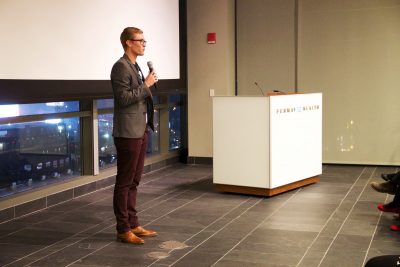
Over a week after Donald Trump was announced president-elect of the United States, Massachusetts transgender leaders have reached a mutual agreement that now is the most important time for the transgender community to unite and act in order to protect their civil liberties.
As part of this call for unity, the Fenway Health Young Leaders Council, in partnership with SPARK Boston, organized a talk Tuesday night with a panel of Massachusetts transgender leaders to discuss how best to move on after the election.
Fenway Health leader Lauren Doty said before the talk that Fenway Health plays a crucial part in the well-being of the Boston transgender community.
“Fenway Health serves LGBTQ and transpeople in the neighborhood, regardless of their inability to pay,” Doty said. “That means that even though we do have universal healthcare now, if that were to go away, Fenway would still provide this health care.”
Justice Williams, founder of the nonprofit social justice and well-being fitness group BodyImage4Justice, said the morning after the election, he was filled with frustration.
“I am willing to admit that there was fear in my heart,” Williams said during the talk on Tuesday. “We had time to make a change when we found out a racist, a misogynist, a homophobe, was running for president. We had time to rally, we had time to tell people that this was not the America I subscribed to.”
Williams said remaining in American is important to strengthen the transgender movement.
“I can’t make it to Canada,” Williams said during the talk. “I have a whole family that is dependent on me. We have a hard road ahead, and it starts here.”
Another speaker who felt strongly about the election results was Chastity Bowick, a worker for the Massachusetts Transgender Political Coalition. She said she worked through discrimination in her upbringing to become an active voice in the community.
“My community right now is in shambles,” Bowick said during the event. “We’re doing our best to provide services to keep people going. We are wondering what is going to happen, will Obamacare still carry out, will people still have coverage.”
Bowick emphasized that togetherness is the most important step going forward.
“We all need to come together — no matter who has had what surgery, who has how much money, who is where,” Bowick said. “Coming together is the first step, before we can rally, before we can do anything.”
Doty finished the discussion with a piece of advice for everyone in the audience, regardless of whether or not they were members of the trans community.
“It’s really important for people to start showing up to things,” Doty said. “It’s time to show up now, even when things don’t have much to do with you, even if you think they don’t matter.”
Kyndal Henicke, a SPARK Boston leader said the talk reflects the Boston community’s unity in supporting transgender people.
“Specifically, we don’t do anything specifically with the transgender community. The genesis of this event is that Lauren Doty, who is a SPARK council member, is also a leader with the Young Leader’s Council,” Henicke said before the talk. “So we love to see our groups intertwine and work together to build the community.”
Molly Snell, 23, of Cambridge, said although she is not transgender, she attended the discussion because she wanted to see what she could do to help going forward.
“We need to be aware of the community around us, and get ourselves involved,” she said after the talk. “If you feel like you might know someone in the trans community, hearing someone’s personal story has helped me to become driven to become a bigger part of it.”
Boston University sophomore and transgender activist Levi Thompson, 20, said he felt affected by the election, but said there will be hope going forward.
“We are going to have to fight, and fight hard to keep funding for clinics that deal mainly with reproductive and LGBT health,” he said after the talk. “We need to start with concrete safeguards for the resources that provide for our community and our wellbeing.”
Richard Raya, 26, a resident of Back Bay, said communication between transgender people and governmental authorities is crucial.
“All minorities will be affected under Trump’s presidency and that’s not to say some might suffer more than other,” he said. “I am not transgender, so I cannot say firsthand how it might feel. I think it’s important to reach out and talk to those who you know who might be affected so that we can help them build up. People are scared and people need our help.”




